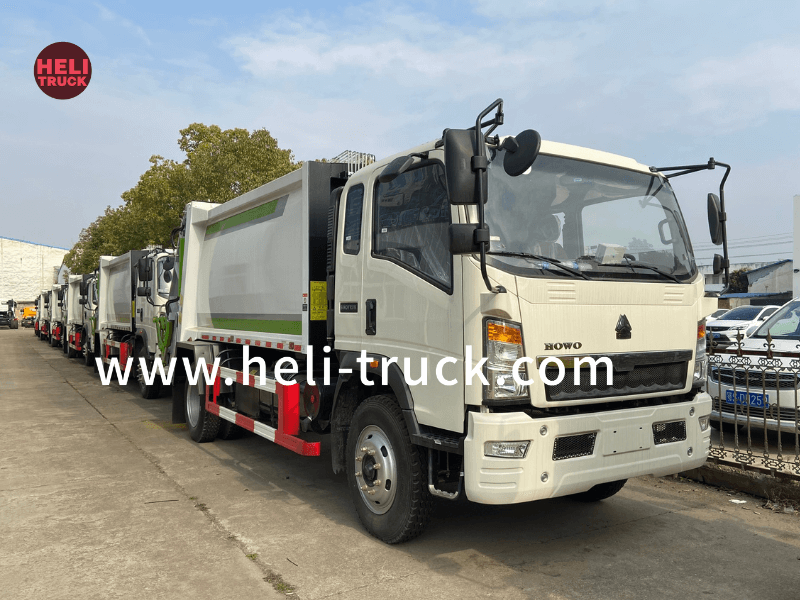Introduction
Waste management is a critical aspect of maintaining environmental sustainability and public health. One of the key components of waste management is the collection and disposal of garbage. Garbage compactor trucks have revolutionized waste collection by efficiently compacting and transporting large volumes of waste. In recent years, advancements in technology have led to the development of garbage compactor trucks with built-in scales. These innovative vehicles offer enhanced efficiency and accountability in waste collection operations. This article explores the evolution of garbage compactor trucks with built-in scales, their benefits, and their impact on waste management practices.
History of Garbage Compactor Trucks
Garbage compactor trucks, also known as refuse trucks or waste collection vehicles, have a long history dating back to the early 20th century. The first motorized garbage collection vehicles were introduced in the 1920s, replacing horse-drawn carts and manual labor for waste collection. These early trucks featured compactors that helped reduce the volume of waste, allowing for more efficient collection and transportation.
Over the decades, garbage compactor trucks underwent significant advancements in design and technology. Modern compactor trucks are equipped with hydraulic systems that compress waste materials, maximizing the truck's load capacity and reducing the number of trips required for waste collection. These trucks come in various sizes and configurations to cater to different types of waste collection needs, from residential to commercial and industrial settings.
Introduction of Built-in Scales
The integration of weighing scales into garbage compactor trucks represents a significant advancement in waste management technology. Built-in scales allow waste collection operators to accurately measure the weight of waste being collected, providing valuable data for billing, monitoring, and reporting purposes. These scales are typically integrated into the compactor mechanism or the vehicle's chassis, enabling real-time weight measurements during the collection process.
The use of built-in scales in garbage compactor trucks offers several key benefits for waste management operations:
1. Accurate Weight Measurement: Built-in scales provide precise weight measurements of collected waste, eliminating the need for manual weighing or estimation. This ensures accurate billing for waste disposal services and helps identify trends in waste generation and composition.
2. Improved Efficiency: By knowing the exact weight of waste being collected, waste management companies can optimize route planning, vehicle capacity utilization, and collection schedules. This leads to increased operational efficiency and cost savings.
3. Data Tracking and Analysis: The data collected from built-in scales can be used to analyze waste generation patterns, monitor collection performance, and identify opportunities for waste reduction and recycling. This data-driven approach enables informed decision-making and continuous improvement in waste management practices.
4. Regulatory Compliance: Built-in scales help ensure compliance with regulations governing waste disposal and recycling. By accurately measuring and reporting waste quantities, waste management companies can demonstrate transparency and accountability in their operations.
5. Environmental Impact: Efficient waste collection and disposal practices facilitated by built-in scales contribute to environmental sustainability by reducing transportation emissions, optimizing landfill usage, and promoting recycling and waste diversion initiatives.
Case Studies and Success Stories
Several waste management companies and municipalities have adopted garbage compactor trucks with built-in scales with positive results. One notable success story is the implementation of these vehicles in a large metropolitan area, where waste collection services were facing challenges related to inaccurate billing, inefficient route planning, and limited data visibility.
By introducing garbage compactor trucks with built-in scales, the waste management authority was able to address these challenges effectively. The accurate weight measurements provided by the scales enabled the authority to streamline billing processes, reduce disputes with customers, and improve revenue collection. Additionally, the data collected from the scales allowed for better route optimization, leading to reduced fuel consumption, lower operational costs, and improved service reliability.
Another case study involves a waste management company specializing in commercial waste collection. By heli truck of compactor trucks with built-in scales, the company was able to offer value-added services to their clients, such as customized waste reporting and analysis. This enhanced level of transparency and accountability helped the company attract new customers and differentiate itself in a competitive market.

Future Trends and Innovations
The integration of advanced technologies such as Internet of Things (IoT), artificial intelligence (AI), and data analytics is expected to drive further innovations in garbage compactor trucks with built-in scales. These technologies enable real-time monitoring, predictive maintenance, and autonomous operation capabilities, enhancing the efficiency and sustainability of waste management processes.
One emerging trend is the use of sensor-based systems that can automatically sort and weigh different types of waste as they are collected. These smart compactor trucks can segregate recyclable materials, organic waste, and general trash on the go, optimizing waste diversion efforts and reducing contamination in recycling streams.
Another future innovation is the adoption of blockchain technology to create transparent and immutable records of waste collection transactions. By leveraging blockchain, waste management companies can enhance trust and accountability in their operations, facilitate traceability of waste streams, and incentivize sustainable practices through tokenized reward systems.
Conclusion
Garbage compactor trucks with built-in scales represent a significant advancement in waste management technology, offering enhanced efficiency, accuracy, and accountability in waste collection operations. These innovative vehicles have the potential to transform the way waste is managed, leading to cost savings, environmental benefits, and improved service quality.
As waste generation continues to rise globally, the need for effective waste management solutions becomes increasingly urgent. Garbage compactor trucks with built-in scales play a crucial role in modernizing waste collection practices and promoting sustainable waste management strategies. By embracing these technologies and innovations, waste management stakeholders can work towards a cleaner, greener future for generations to come.
